ID :
426946
Mon, 12/05/2016 - 14:54
Auther :
Shortlink :
https://www.oananews.org//node/426946
The shortlink copeid
Presidential aide warns against practical violation of JCPOA

Tehran, Dec 5, IRNA – In the face of the US Senate decision on renewal of Iran Sanctions Act (ISA), Iran's response should be predicated on mechanisms provided by the landmark nuclear deal, known as the Joint Comprehensive Plan of Action (JCPOA), says an advisor to President Hassan Rouhani.
'Our response should not be amounted to practically violating the deal,' Hamid Aboutalebi President Rouhani's Deputy Chief of Staff for Political Affairs wrote in an article a copy of which was received by the Islamic Republic News Agency (IRNA) on Sunday.
He made the comments following the latest anti-Iran move made by the US Congress that voted on December 1st unanimously, on renewal of the Iran Sactions Act (ISA) which is set to be expired by the end of 2016. The US congressmen sent the legislation to the White House to be signed into law by President Barack Obama.
Excerpts of Aboutalebi's article follows:
The move by the US Senate to extend Iran sanctions has provoked different reactions in Iran. But, as far as the international laws and conditions of the parties involved in making the historic nuclear deal between Tehran and six major world powers are concerned, the JCPOA establishes an almost rare agreement.
The JCPOA not only embraces reservations voiced by the G5+1 members (US, Britain, Russia, France and China plus Germany), but also it takes into account views of the Iranian side. So, we could well argue that it is neither a treaty nor an agreement.
Furthermore, the JCOPA is not solely the consequence of an executive decree by a US president against China, nor does it resemble a treaty signed between the US and former Soviet Union. This, after all, is the special characteristic of the Joint Comprehensive Plan of Action and maybe in the future, the nuclear deal could be defined based on the international legal frameworks.
As far as the documentation of such deals prescribes, the JCPOA is a text which was prepared by no confidence and based on total mistrust.
On the other hand, despite being annexed to a resolution by the United Nations Security Council, the JCPOA does not necessarily establish a multilateral commitment, or at least I doubt it does so. From a legal perspective, and based on its individual mechanisms, the landmark nuclear deal rather resembles a 'Gentlemen's Agreement'. It should be mentioned that, neither the JCPOA nor any annex to a UNSC resolution is drawn up based on the 'principles' of good will, trust or whatsoever. Hence, it denies us the possibility to base our arguments on such principles.
Presently, the US Senate move to renew the ISA for another ten-year period, contributes to the 'conceptual violation' of the JCPOA. Yet, it 'practical violation' can be prevented by executive decrees of the US current president. Therefore, any counteraction on our side should be based on the mechanisms provided by the JCPOA.
It sounds much better for us to act similar to the America officials and pass certain legal acts and measures executable only when the ISA comes into force.
Iran, so far, has faced baseless charges aimed at undermining its peaceful nuclear activities, and now the country has to deal with obstacles created by the parties that are against the full implementation of its historic nuclear deal. But, according to the JCPOA mechanisms, it is the other side that should be held accountable for its actions.
Iran is going to reserve itself the right to use all the options on the table, should they put into force the ISA.
Translated by: Reza Bahar
Edited by: Fatemeh M. Safaei
1378/IRNA





